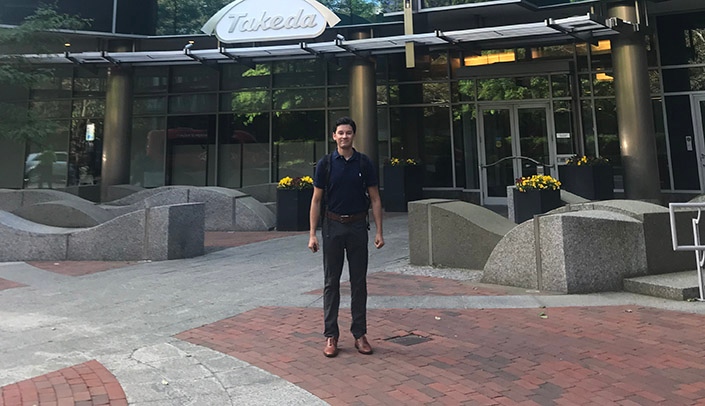Many graduate students may go into their Ph.D. training with the idea of obtaining faculty positions at research universities. But, “It’s incumbent on us to make sure students can really see all opportunities,” said Aaron Mohs, Ph.D., director of the pharmaceutical sciences graduate program.
Thus, Dr. Mohs and other Graduate Studies leaders have been encouraged by the recent success of several UNMC Ph.D. students in obtaining internships in industry, as well as academia.
Nicholas Wojtynek, a Ph.D. student in Dr. Mohs’ lab, recently returned from a 12-week summer internship with Takeda Oncology at its U.S. headquarters near Boston. Wojtynek worked at Takeda’s global medical affairs department, on the publications team. This wasn’t lab work — instead, he worked on publications and presentation of data and clinical trials results.
He also was responsible for a large-scale project to research and assess the digital impact of Takeda publications — which also resulted in a framework of recommendations on how to improve the “digital reach” of the company’s science.
“They put me to work at Takeda,” Wojtynek said.
His experience there was also an illustration of UNMC Graduate Studies’ emphasis on developing the “soft” skills, as well as technical skills, needed for the industrial job market.
Dr. Mohs said Ph.D. training is more than just research aptitude. It’s also about developing leadership skills — and perhaps most of all, the ability to solve problems in a variety of environments or situations.
Dr. Mohs said a good Ph.D. should be able to thrive not just in an academic environment, but also could prove valuable in industrial, government, or business and venture capital fields.
Though networking is always encouraged, Wojtynek said he believes he got the job because the skills on his resume — skills he developed at UNMC — lined up with what Takeda was looking for to fill this role.
Ph.D. student Deep Bhattacharya, who earned six-month co-op internship at GlaxoSmithKlein, offered the following tips for obtaining an internship:
- Attend conferences such as AAPS and ACS.
- Revamp your LinkedIn profile and connect with industry professionals in your field of interest.
- Formulate a two-page resume and ready-to-preach elevator speech.
- Networking!
- Conduct short informal interviews with industry professionals.
Wojtynek said he relished the opportunity for networking during his internship, “Especially at a place like Boston . . . just walking to work, you pass 10 to 15 biotech companies.” At Takeda, “I tried to meet a new person from every department every week.”
Obtaining an internship may take “brute force” determination, Dr. Mohs said. But resources and support toward that effort are available on campus.
For example, Zhen Ye, a Ph.D. student in Dr. Joe Vetro’s lab, recently presented on her strategy for obtaining an internship at AstraZeneca.
“We emphatically support (graduate students’) career development, and this is one of the ways to do that,” Dr. Mohs said.
